While the offer in your sales campaigns surely matters, how you frame and promote them often plays a more crucial role in converting prospects into customers.
By combining website popups with email marketing, you can ensure your offers reach the right users at the right time.
If you’re looking for some inspiration for your next campaign, here are seven money-making sales promotion examples from top e-commerce brands. Plus, ways you can copy them for your business.
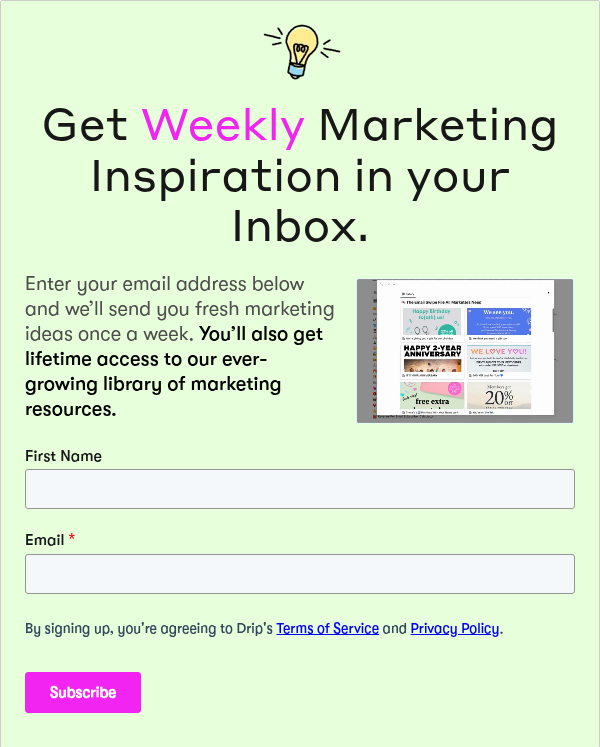
7 Sales Promotion Examples
What Is a Sales Promotion?
A sales promotion is a marketing strategy where you can use targeted email campaigns to spark interest and create demand for your products and services. Sales promotions emails can have several objectives and outcomes, which I’ll explore in detail throughout this article.
1. Limited-Time Offers
Whether it’s a discount code or free shipping you’re offering, limiting your incentive with time helps you convert more prospects into customers for a few reasons:
- Limited-time offers drive a sense of urgency and scarcity of availability; and
- They trigger consumers’ fear-of-missing-out (FOMO).
There are many different ways you can use limited-time offers in your emails and on your site, and here are three of its best examples.
i. Limited-Time Discounts
If you’re running a limited-time sales campaign, you want to ensure that as many prospects as possible know about it.
Using onsite messages helps you achieve this goal by informing your site visitors about your time-sensitive offers.
Check out this example by Pura Vida Bracelets:
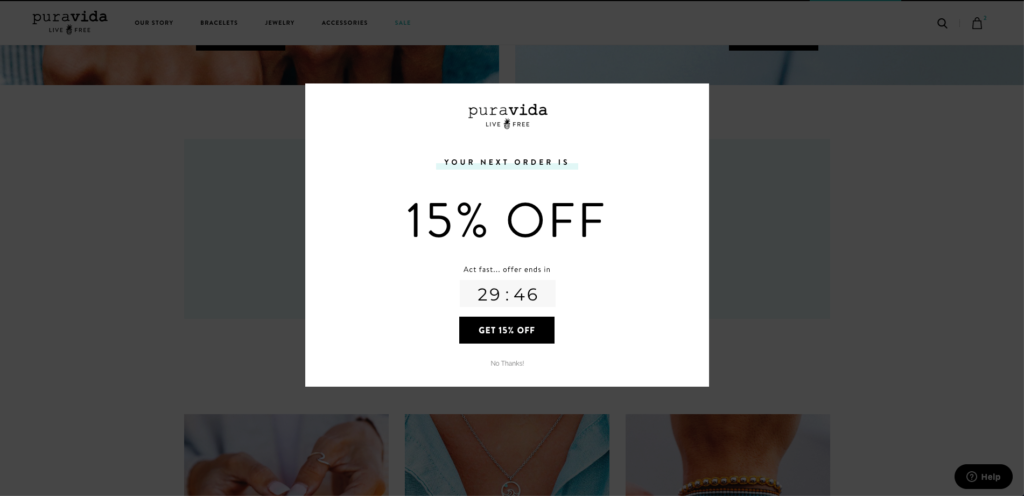
With this exit-intent popup, the company offers 15% off your next order with the goal of converting you into a customer.
Unlike many online stores that rely on discount codes, Pura Vida knows the influence of limited-time offers on hesitant visitors. That’s why they add a countdown timer to their popup and invite you to make a quick decision by driving urgency.
ii. Limited-Time Free Shipping
While many marketers immediately think of discounts when they plan sales campaigns, some brands knows that free shipping is a more powerful incentive.
Yet, only a handful of them combine free shipping with limited-time offers.
Vinomofo is one of those brands:

With this personalized subject line addressed to Rikke, Vinomofo promotes their offer clearly and makes you want to open their email.
Then, you discover that the company is running a flash sale campaign with free shipping, but only for a certain time:
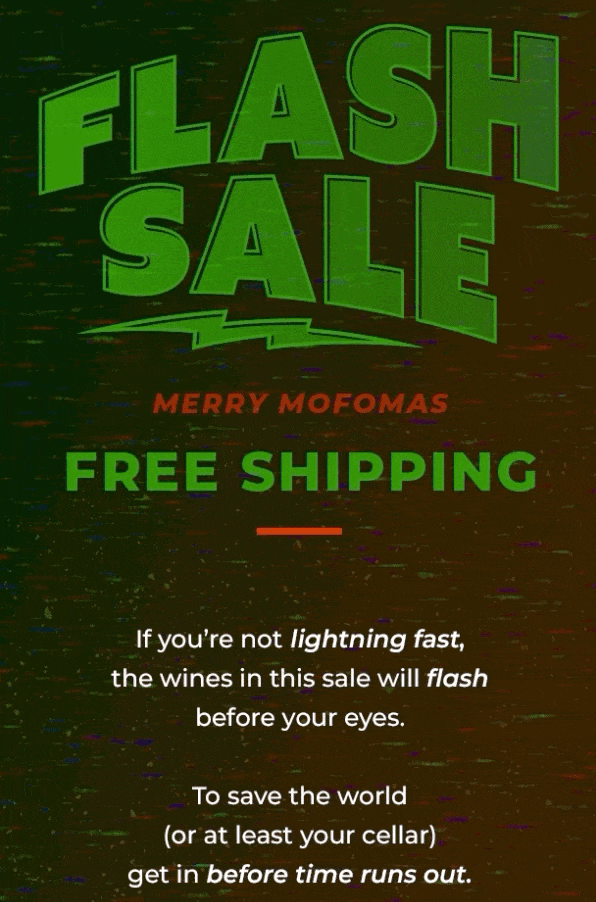
Notice how Vinomofo drives a feeling of urgency by cleverly using a GIF.
To engage your site visitors and promote your free shipping offer, you can create a popup that shows only on your product pages. Lastly, don’t forget to drive urgency with a countdown timer:
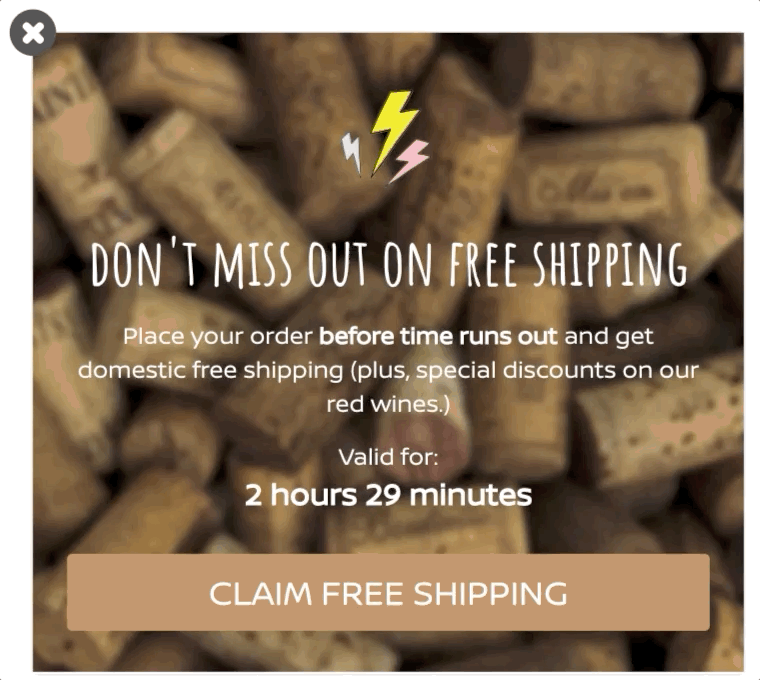
(ProTip: Add GIFs to your popups to make them eye-catching.)
iii. Limited-Time Freebies
While “10% off” might prompt some users to take action, it’s harder to resist the highly persuasive power word “free.”
Furthermore, we know from our customers’ experience that physical products outperform discount codes as incentives.
Combining the two, “free products” work like a charm to convince on-the-fence prospects.
Although offering free products is an effective customer activation strategy, it’s not feasible in the long term.
Instead of decreasing your profits and reducing your products’ perceived value, run a limited-time campaign where you offer free products and promote it on your site.
Just as BarkBox does:
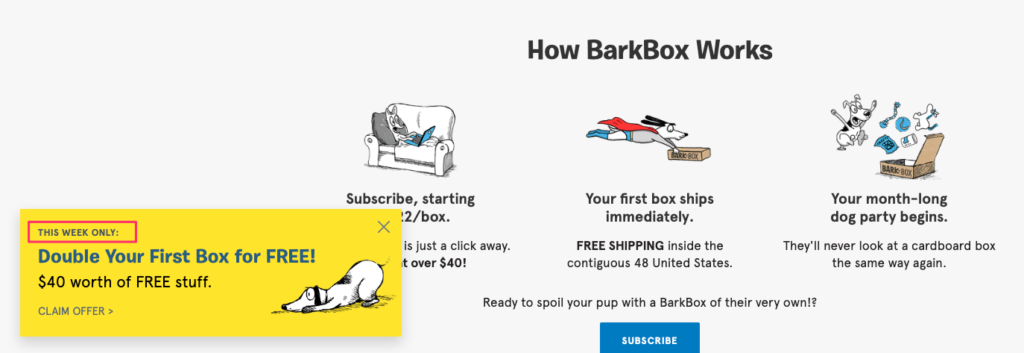
Add a countdown timer to enhance your popup and hide it from your logged-in customers, using our SiteData condition.
Further Reading
2. Daily Deals
One brilliant sales promotion technique that creates excitement among consumers is daily deals.
Despite its effectiveness in converting prospects into customers, most companies, understandably, cannot afford to offer a new deal every day.
If you want to use daily deals as part of your sales promotion strategy, try combining it with your holiday campaigns.
While you can find an excuse to run a daily deal campaign at any time of the year, December is the perfect time for it, in my opinion.
Many companies already leverage the days leading up to Christmas by selling advent calendars with their products. While the advent calendar strategy works for physical products, it can easily help achieve your online conversion goals, too.
Poo~Pourri knows this well. That’s why they offer six different deals over 12 days before Christmas and promote them in their emails:
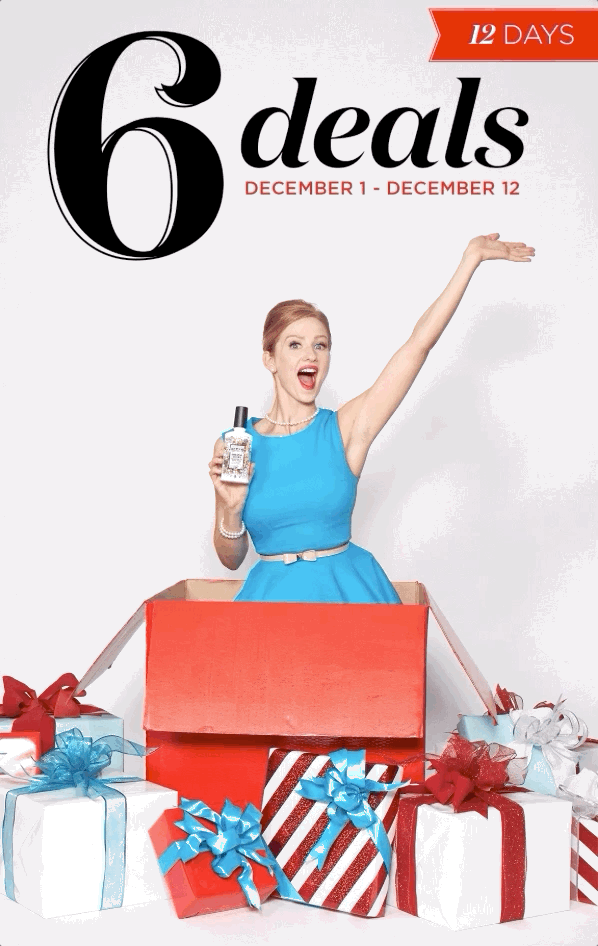
With a sales campaign they call “12 Days of Spritzmas,” the company emails you with a new deal every other day, ranging from special discounts to product bundles:
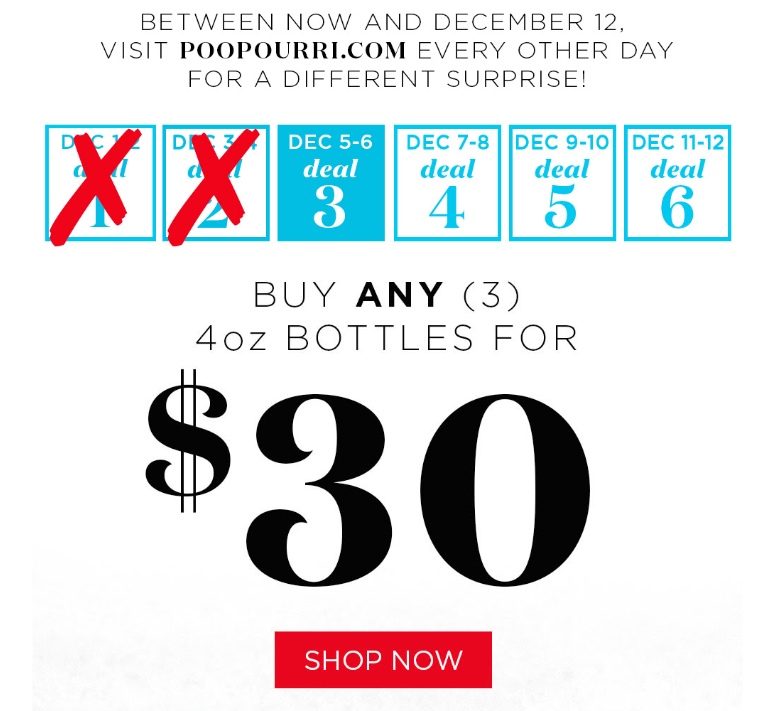
Poo~Pourri creates a curiosity gap and, as a result, you check your inbox the next day to learn about their new surprise offer. Because you know if you don’t grab a daily deal, it will be gone forever (read: scarcity).
If you’re wondering how you can apply this strategy on your site, Creativ Company has the answer for you:
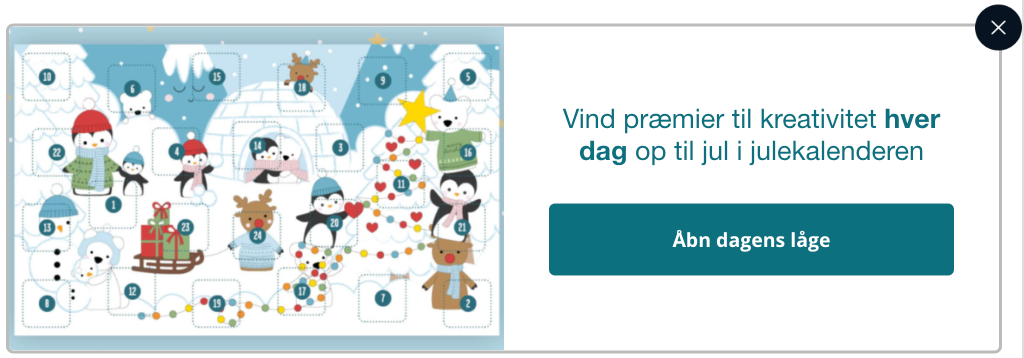
In this advent calendar popup, Creativ Company asks you to open a new door every day to reveal the offer of the day, for 24 days until Christmas.
This way, the company successfully applies the idea of advent calendars to their website popups.
It’s a brilliant on-site sales promotion technique that builds anticipation and creates mystery during the holiday season.
Plus, you can create and set your campaigns long before Christmas with Advanced Scheduling.
Further Reading
3. Mystery Offers
While advent calendars are one way to evoke curiosity with your sales campaigns, mystery offers help engage your prospects all year round.
Building on the suspense of a surprise offer, you can make your sales campaigns more attention-grabbing by hiding the incentive.
Take a look at how American Eagle uses mystery offers in their email marketing:

With this subject line, the company openly states what’s waiting for you inside, yet, they keep the offer a secret.
And in the email body, they build further anticipation:
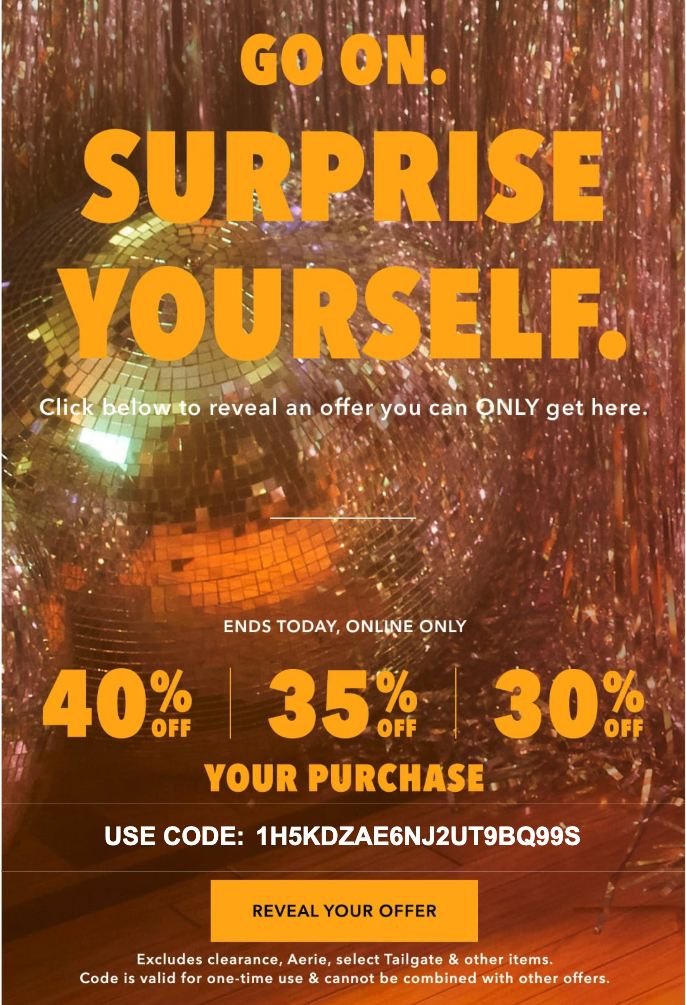
American Eagle combines scarcity and exclusivity with their mystery deal, and sends you a discount code with an offer “you can ONLY get here.”
Notice the call-to-action (CTA) button “Reveal Your Offer” and how it encapsulates the excitement of opening a present.
Another company that uses mystery in their emails is Chubbies. However, rather than hiding the discount, Chubbies incorporates mystery into their Black Friday campaign:
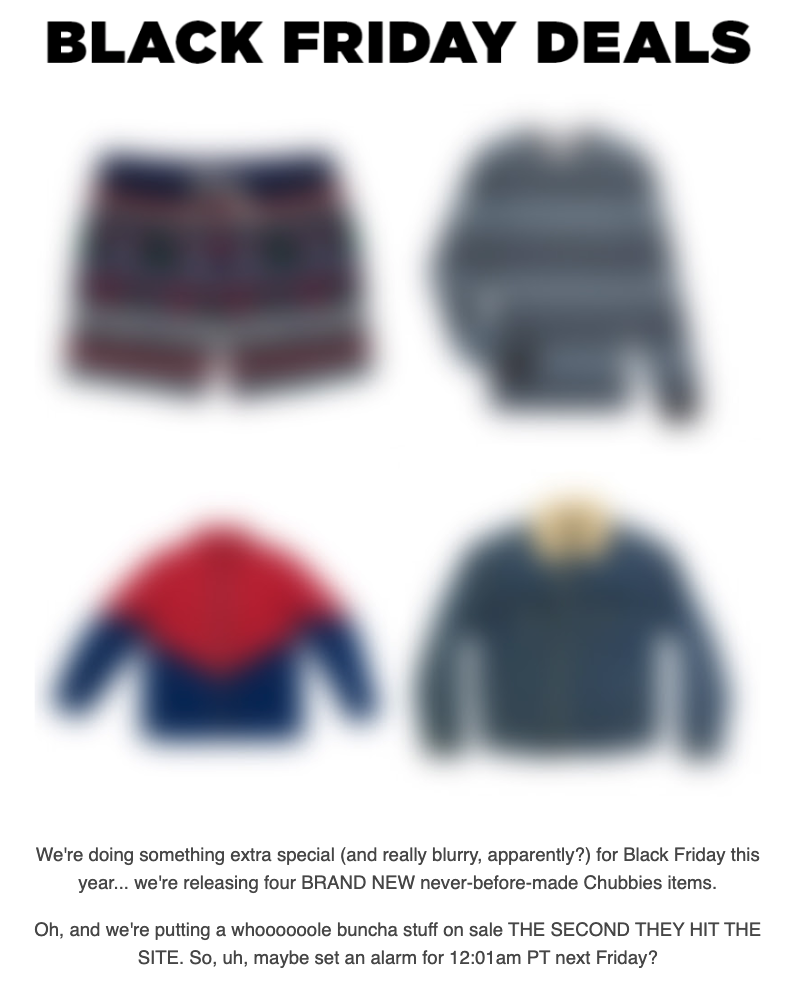
Teasing their Black Friday deals, Chubbies uses blurred images of their new product line and creates mystery around them.
This is a smart sales promotion technique that works not only in email marketing but also in website popups.
Taking inspiration from Chubbies, you can promote your special deals or new arrivals with mystery products:
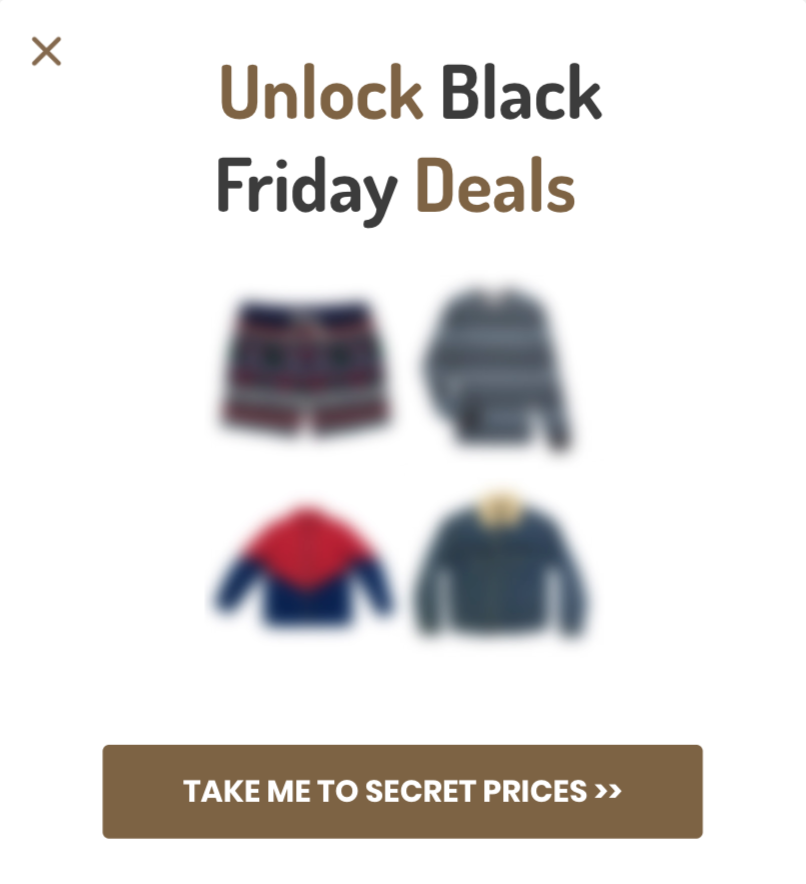
Unleash your creativity and you’ll drive more visitors to your product pages.
4. Cross-Sell Campaigns
You’re likely familiar with the following: You want to sell more while you got your visitors’ attention, but you don’t want to scare them away by sounding too salesy.
With cross-sell campaigns, you can convert users who are at the decision stage of your sales funnel with a higher order value.
How you frame your cross-sell campaigns, however, is the most critical step of this type of sales promotion.
kikki.K recently sent me this email with the subject line “4th free, when you buy 3”:
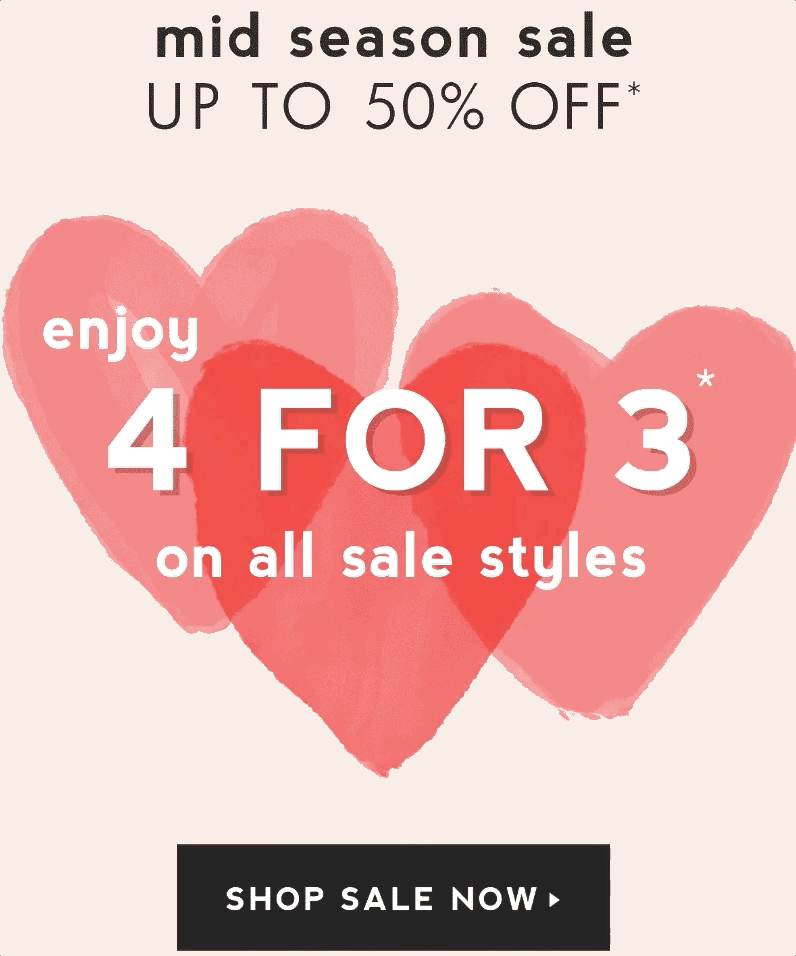
While “buy 2, get 1 free” is the oldest sales promotion tactic in the book, kikki.K executes it successfully in their emails.
The company uses GIFs to spice up this otherwise boring promotional email and visually describes your gain from it:
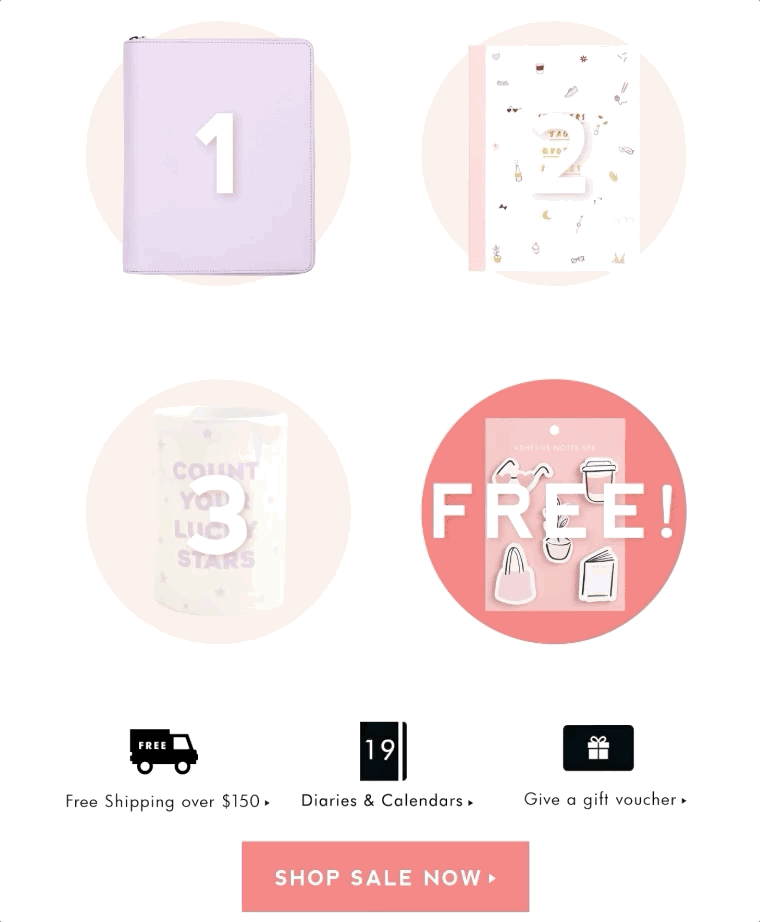
It’s as easy as “1, 2, 3, Free!”
If you don’t want to give your products away, free shipping is your best incentive option. And it works just as well in cross-sell campaigns.
Consumers are willing to spend more when free shipping is an option. This is a great chance to increase customers’ average order value with relevant products.
Tarte cleverly uses free shipping in their cross-sell campaigns. Check out this email they send with the subject line “1 + 1 = Free shipping”:
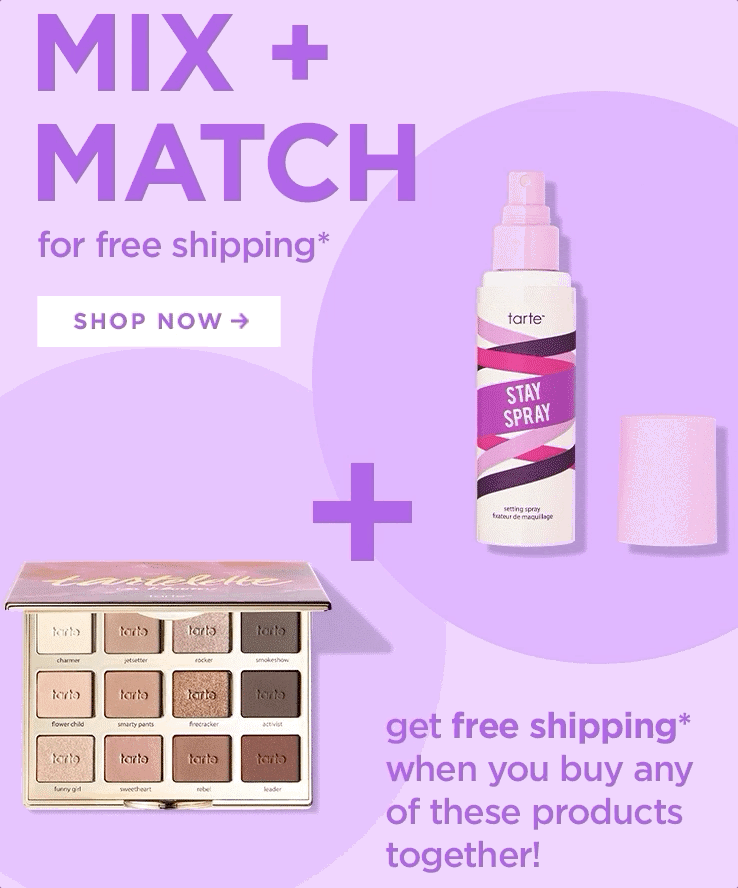
If you want to qualify for free shipping, you need to combine these two products in your order.
The key to making this campaign work is to pick complementary products that are often bought together. Plus, you need to nudge users at the right time with website popups.
You can use our SiteData condition to trigger a popup and recommend complementary products when a visitor adds the first item to their cart:
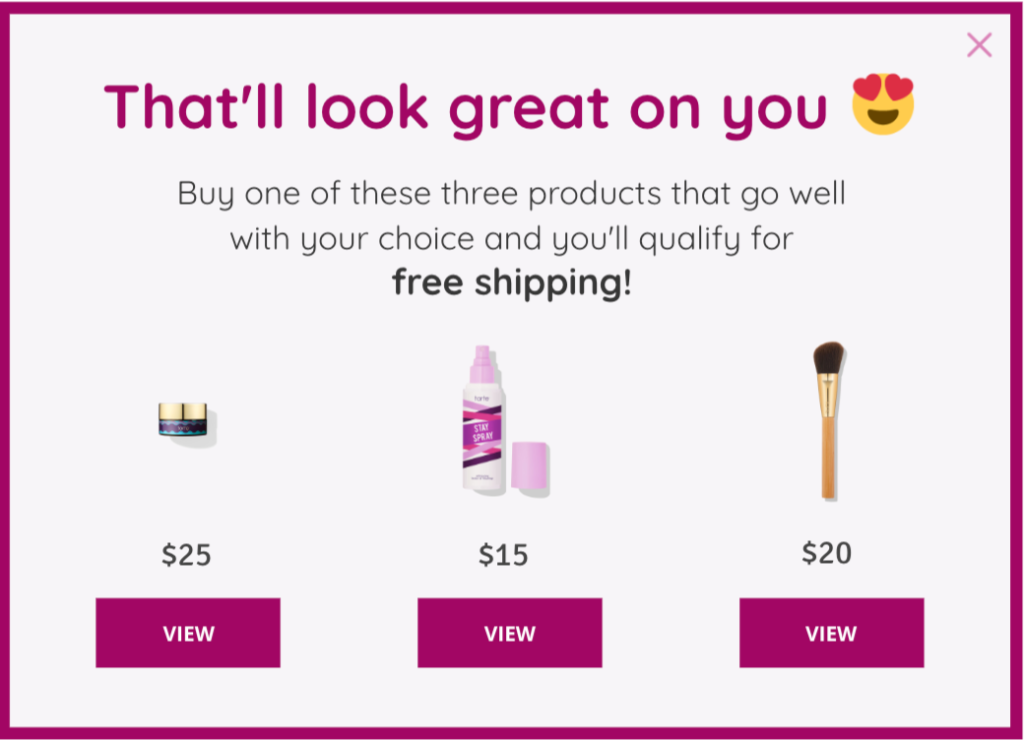
It’s a subtle yet effective nudge to increase your customers’ order value with personalized recommendations.
5. Subscriber Specials
While discounting is an effective sales promotion strategy, you need to use it wisely.
Your long-time subscribers and first-time visitors have different needs, questions, and concerns. If you treat them the same way, you risk losing both.
Offer discounts to everyone and you’ll reduce your products’ perceived value. But offer them to the right users at the right time and you’ll have loyal customers.
Limiting your deals to email subscribers helps you reward your prospects when it’s deserved and encourages them to become a customer.
Monki knows how to appreciate their subscribers. Take a look at this email they send to their email list:

Framing their mid-season sale as “VIP Sale” and inviting you to it, Monki creates an exclusive feeling in this email.
As you scroll down, they explain why you are a VIP and why you get this email:
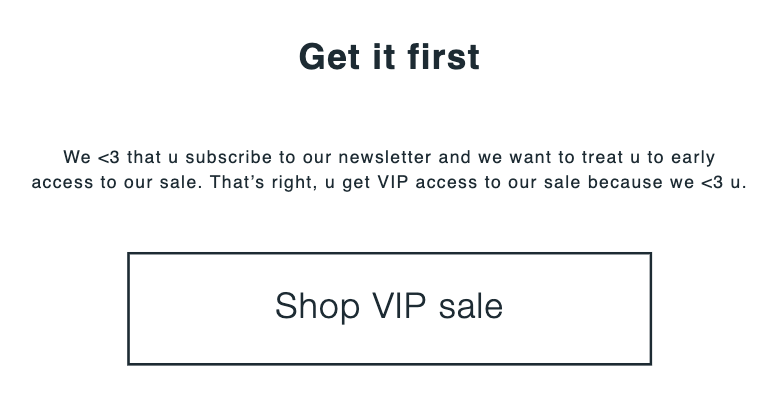
Monki appreciates your decision to sign up for their newsletter and they reward you for it with early access to their mid-season sale.
An underused on-site sales promotion technique is to welcome returning visitors with a special offer.
And subscriber deals are the perfect example of it.
Here’s a subscriber-only popup example you can use to inform subscribers about your next sale when they return to your site:
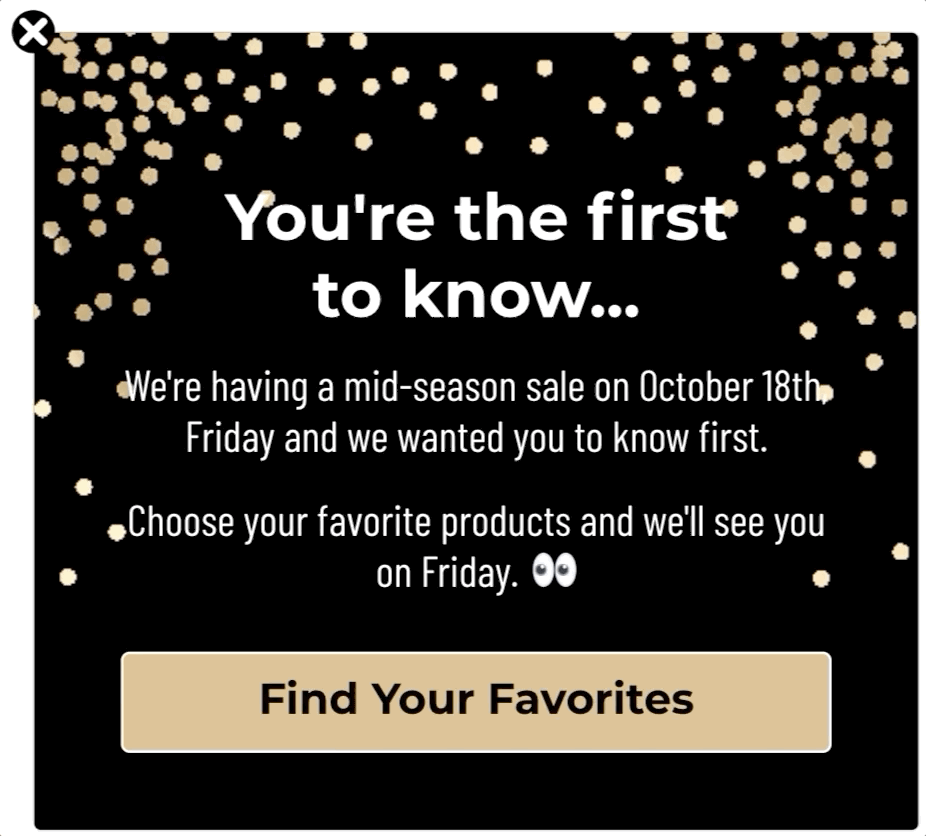
Make sure to use our “Newsletter Subscriber” condition and your popup will only show to your existing subscribers.
6. Clearance Sales
Whether it’s the end of the year or you need to make space in your inventory for a new product line, clearance sales are both online and offline retailers’ favorite.
It’s a smart excuse to finish your stocks especially if you’re selling seasonal products, such as winter clothing, pumpkin-themed candles, Christmas decorations, and so on.
Clearance sales are effective because consumers associate them with good bargain prices. Plus, it contains scarcity and urgency since the number of available items are limited.
American Eagle uses this sales promotion technique in their emails. Check out this email they send with the subject line “Up to 70% off clearance: THIS. NEVER. HAPPENS.”:
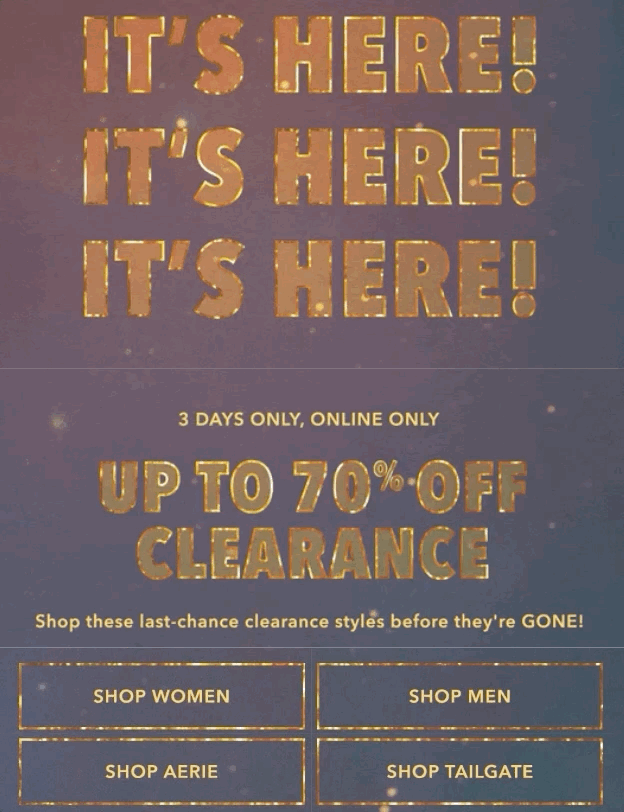
The company highlights the exclusivity and urgency of the deal by telling that the sale is “3 days only” and “online only.”
Next, American Eagle invites you to buy these last-chance products before they’re GONE.
Notice how the company uses scarcity to prompt you to take action as soon as possible.
Another company that runs clearance sales is J.Crew Factory and they promote their campaign with the subject line “1,000 clearance styles you just baaarely missed!”:
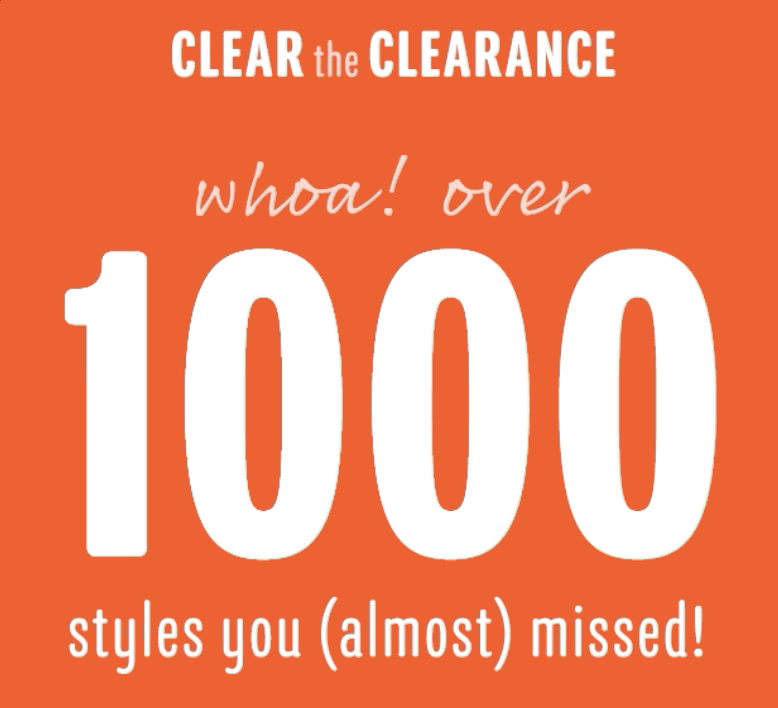
J.Crew Factory uses a specific number in the email to describe the extent of their sales campaign and openly triggers your FOMO.
7. Seasonal Deals
It’s not every day that you find an excuse to promote your products without coming off as salesy.
That’s why you need to leverage holidays and position your products as the best gift options on the market.
While it’s difficult to get your prospects’ attention around Christmas or Black Friday, not all holidays are as busy.
Here’s how BarkBox uses National Dog Day as an excuse to offer seasonal deals:
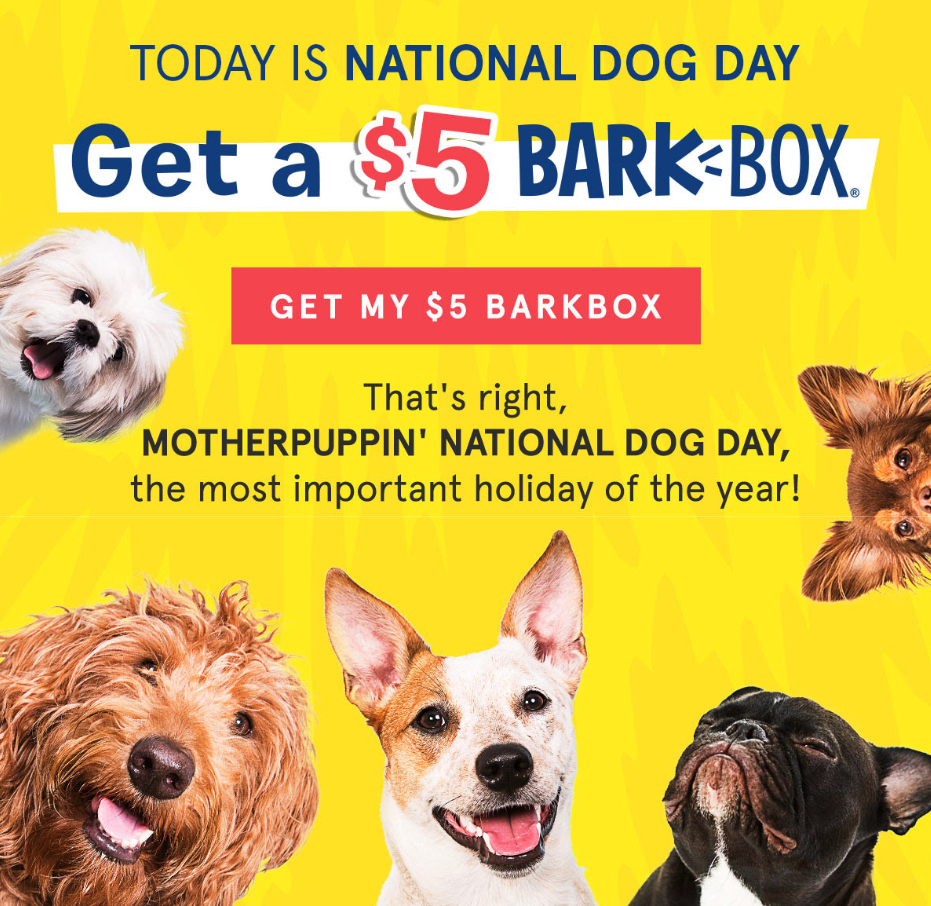
Even if you never celebrated National Dog Day, now you know about this “most important holiday of the year” with BarkBox’s email.
This seasonal deal is a brilliant sales promotion example because it resonates well with the company’s target audience.
After creating demand for their products with this niche holiday, BarkBox suggests you three steps to celebrate it:
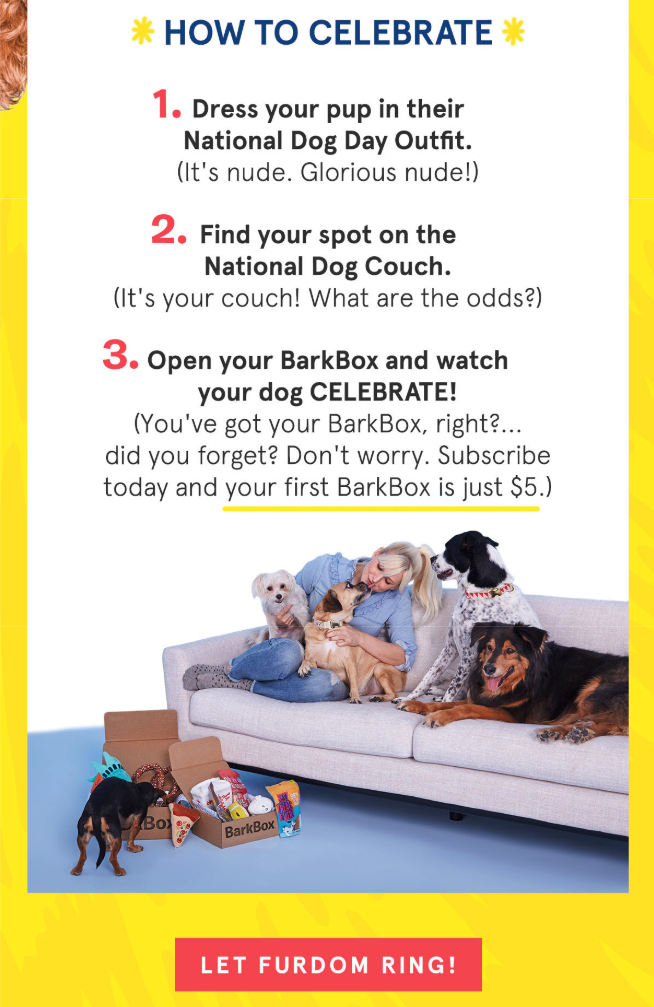
If you haven’t already guessed, it involves buying their products (at a reduced price.)
Conclusion
While there are countless different sales promotion examples you can try for your e-commerce brand, today, I wanted to show you the importance of framing and distributing them the right way.
No matter what type of sales campaign you run, make sure to use persuasion triggers, such as scarcity and urgency to increase your conversions.
Don’t forget to combine email marketing with website popups for the best possible results.



